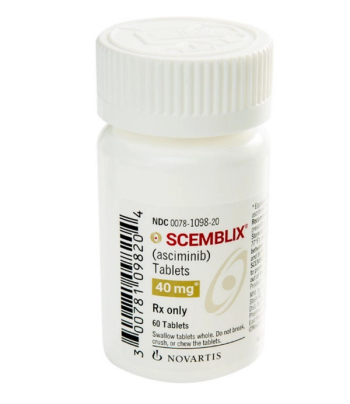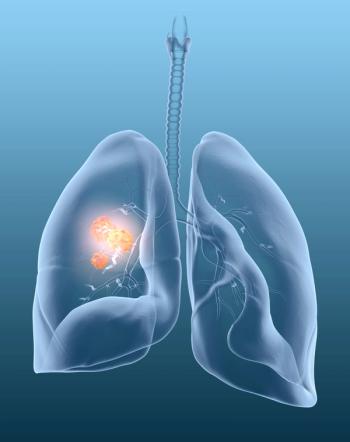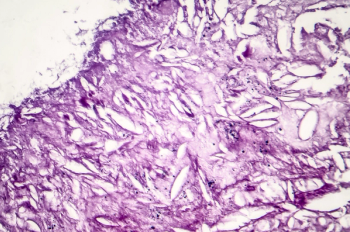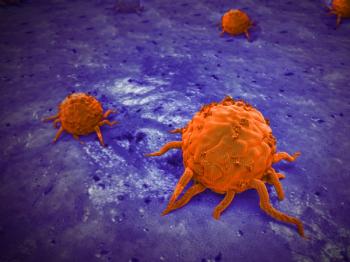
Regardless of the ability to access and dispense products, pharmacists are responsible for getting patients the best care.

Regardless of the ability to access and dispense products, pharmacists are responsible for getting patients the best care.

Sonia T. Oskouei, PharmD, vice president of biosimilars at Cardinal Health, discussed how pharmacists can impact biosimilar adoption.

Trials results show darolutamide, docetaxel, and androgen deprivation therapy (ADT) reduced the risk of death by 32.5% versus docetaxel/ADT in patients with metastatic hormone-sensitive prostate cancer.

Ray Tancredi, divisional vice president of Specialty Pharmacy, Development & Brand Rx/Vaccine Purchasing at Walgreens, discusses some of the more significant drugs for specialty pharmacy in the FDA pipeline this year.

Discovery has the potential to also benefit treatment choices, investigators from Georgetown Lombardi Comprehensive Cancer Center say.

Study shows high-dose vitamin D, omega-3s, and a simple home strength exercise program led to a cumulative reduction in cancer risk by 61% in healthy adults 70 years of age and older.

Tracy Russell, senior director of State Government Affairs at CoverMyMeds, discusses how the role of the pharmacist in the specialty pharmacy space has expanded during the COVID-19 pandemic.

Tizlelizumab is a unique anti-PD-1 monoclonal antibody that is being analyzed in 14 pivotal clinical trials across an array of solid tumors.

Omidubicel is a first-in-class, advanced nicotinamide-enabled stem cell therapy candidate being evaluated as the first potential allogeneic advanced cell therapy donor source for individuals with blood cancers in need of a transplant.

Acute graft-versus-host disease (aGVHD) is the most frequently encountered, life- threatening complication following an allogeneic hematopoietic stem cell transplant (aHSCT).

Scemblix is indicated for Philadelphia chromosome-positive chronic myeloid leukemia in chronic phase, previously treated with 2 or more tyrosine kinase inhibitors.

The data show that the 10-year survival rate of patients with breast cancer who survived Hurricane Katrina was much lower than those who did not face a major weather event.

Two-thirds of women diagnosed with endometrial cancer have localized disease and a 5-year relative survival of 95%.

Up to 50% of all patients with breast cancer have tumors with a HER2 immunohistochemistry level not currently eligible for HER2-targeted therapy.

Oncologists and rheumatologists reported the highest costs to their practices at $6700 and $7900 per month, respectively.

STRIDE regimen of a single priming dose added to Imfinzi is the first dual immune checkpoint blockage regimen to improve overall survival in a phase 3 trial in this setting.

Belumosudil is indicated to treat individuals aged 12 years and older with chronic graft-versus-host disease who have received at least 2 prior systemic therapy treatments without success.

An expert panel engaged the audience in a live virtual symposium and case discussion on immune checkpoint inhibitors (ICIs) in the first-line treatment of non−small cell lung cancer (NSCLC) at the 2021 ASHP Midyear Clinical Meeting.

Because of the likelihood that patients with melanoma will develop adverse effects on therapy, it is crucial for pharmacists to proactively educate patients and provide them with tools to help mitigate and manage these issues.

Attendees of this live virtual program learned the latest and greatest in a presentation from 2 expert oncology pharmacists.

The results lead to a possible new therapeutic approach to improve immunotherapy outcomes, including combinations with vitamin E, as well as directly targeting SHP1 in dendritic cells.

In a live virtual symposium at the 2021 ASHP Midyear Clinical Meeting, 2 experts teamed up to highlight the place in therapy and management of oral oncolytics in follicular and marginal zone lymphoma.

Elaine Jaffe, MD, National Institutes of Health (NIH) distinguished investigator at the National Cancer Institute at NIH, offers guidance for female medical researchers who are faced with a declining number of female colleagues in the workforce.

The updated efficacy analyses showed that tislelizumab in combination with chemotherapy continued to demonstrate a clinically significant progression-free survival benefit for individuals with recurrent or metastatic nasopharyngeal cancer.

The analyses are shared at the American Association for Cancer Research Annual Meeting 2022 in New Orleans, Louisiana.

The agent is the first oral therapy for this indication.

Investigational CAR T-cell therapy is currently being evaluated in an ongoing dose escalation phase 1 trial to analyze its safety and tolerability in treating non-Hodgkin lymphoma.

Elaine Jaffe, MD, National Institutes of Health (NIH) distinguished investigator at the National Cancer Institute at NIH, discusses where she sees the classification of lymphoma progressing in the coming years.

Analyses are shared at the American Association for Cancer Research Annual Meeting 2022 in New Orleans, Louisiana.

Sonia Oskouei, PharmD, vice president of biosimilars at Cardinal Health, on the results of Cardinal Health’s assessment of the current biosimilars market published in the 2022 Biosimilars Report.